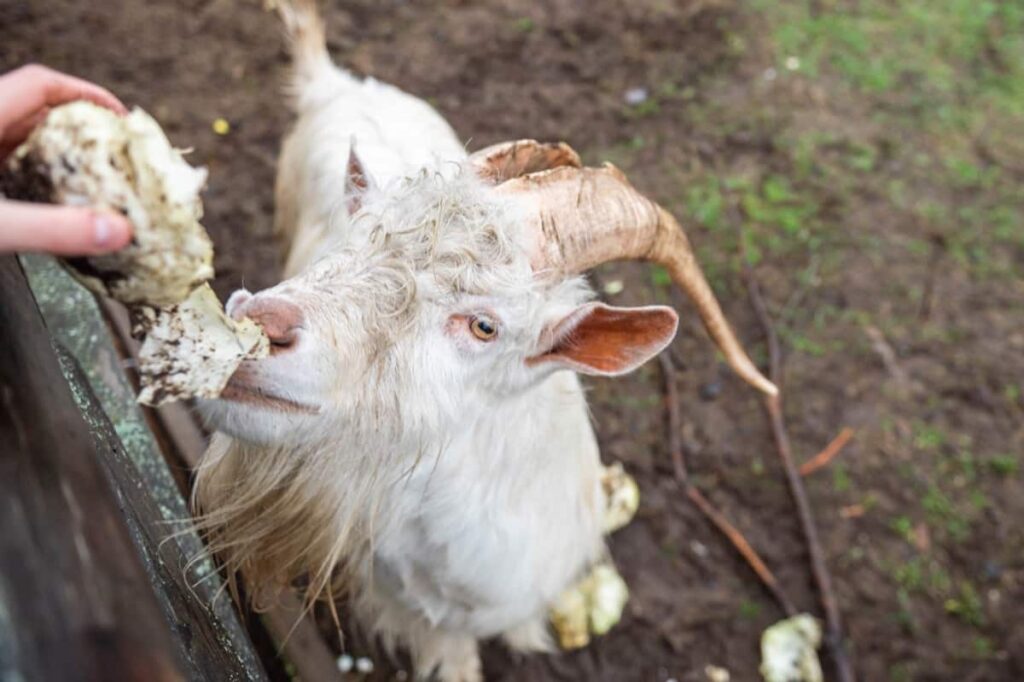The Dutch Landrace goat was initially bred for milk production, but over time it became apparent that this breed had other uses. Its hardiness made it an ideal meat production, while its long hair provided fiber for textiles.

Dutch Landrace Goat Breed Profile
- Country of Origin: The Netherlands
- Color: Black, white, and grey coat with tan markings; black, white, and grey undercoat. They exhibit the same color patterns as their coats.
- Gestation Period: 150 days
- Milk Quality: Good, Nutritious for the kids
- Weight: Male – 75 kg, Female – 60 kg
Characteristics and Appearance of the Dutch Landrace Goat
- The Dutch Landrace goat is a medium-to-large-sized breed with a distinctive appearance. They are known for their strong and muscular build, with males weighing an average of 75 kg and females averaging 60 kg. These goats also have good height, with males standing at around 79 cm and females at about 67 cm.
- The Dutch Landrace goat has erected ears that can be long, giving them an alert look. Their eyes are prominent and expressive, which adds to their overall appearance.
- Dutch Landrace Goats are still very hardy animals that can adapt to different environments and climates. Their sturdy and muscular build makes them well-suited for meat production.
The Temperament of the Dutch Landrace Goat
- The Dutch Landrace goat is known for its friendly and curious temperament, making it a popular breed for those who enjoy keeping goats as pets. This breed is generally calm and docile, with a natural curiosity that makes them easy to handle.
- Despite their gentle nature, Dutch Landrace goats can be quite independent and may require some patience when training. However, once they have established trust with their owner, they are loyal companions who will follow them around the farm or yard.
- Another unique characteristic of this breed’s temperament is its adaptability to different environments. They can tolerate harsh climates and rough terrain without compromising health or performance levels.
- The temperament of the Dutch Landrace goat makes them an excellent choice as a pet and as livestock for milk or meat production purposes.
What Do Dutch Landrace Goats Eat?
- Dutch Landrace goats are known to be hardy and adaptable animals, making them easy to manage when it comes to their diet. Generally, they can eat anything from grasses and hay to grains and supplements.
- One of the primary food sources for Dutch Landrace goats is pasture grazing. They love being outside in a field to eat fresh grass and other plants that grow naturally.
- Some farmers also provide them with grain-based feed such as corn or oats, which provides extra protein necessary for milk production or weight gain if raised for meat production.
- It’s essential not to overfeed them because overweight Dutch Landrace goats can develop health issues. Farmers must ensure their water source is always clean and readily available since these animals require lots of water daily.
Dutch Landrace Goat Farm Management Tips
- It is important to have a well-planned breeding program. This involves selecting the best quality animals for breeding and keeping detailed records of their genealogy and health status. By doing so, you can ensure that the offspring produced will be healthy and of high quality.
- Providing adequate nutrition is essential in maintaining the health of your herd.
- Regular veterinary check-ups are necessary to detect potential illnesses before they become serious problems. Vaccination schedules should also be followed to prevent disease from spreading throughout the herd.
- Maintaining clean living conditions through regular cleaning of barns and pastures prevents disease outbreaks while promoting good hygiene practices among workers involved in daily chores such as milking or feeding.
In case you missed it:

Dutch Landrace Goat Raising Problems and Control
- One of the common problems observed in Dutch Landrace goat farming is parasites. These external and internal parasites can cause serious health issues in your herd if uncontrolled.
- Routine deworming and sanitation practices must be implemented to manage parasite infestation. Ensure you maintain proper hygiene by cleaning their shelter regularly and removing feces to reduce exposure to bacteria and other pathogens.
- Another challenge when raising this breed is mastitis – an infection of the udder that could lead to inflammation or even death. Maintaining good milking hygiene standards such as clean hands, utensils, and milk storage containers would go a long way towards preventing mastitis.
- Predators like coyotes, foxes, and mountain lions also threaten your herd’s safety. Fencing your pasture properly with sturdy fencing materials will help prevent predators from attacking your goats at night.
Uses for the Dutch Landrace Goat
- The Dutch Landrace goat is a versatile breed that can be kept for various purposes, including meat, milk, and fiber. The breed’s adaptability to different environments and climates has made it a popular choice among goat farmers worldwide.
- For meat production, the Dutch Landrace goat is highly valued for its tender and flavorful meat. Additionally, their carcasses have little fat content making them a healthy option.
- In addition to their use in food production, the breed’s long-haired coat produces high-quality mohair fibers used in textile manufacturing. They are often kept as pets or show animals due to their friendly temperament and attractive appearance.
Care and Management of the Dutch Landrace Goats
- Caring for Dutch Landrace goats is not difficult as long as you provide them with necessities such as food, water, shelter, and proper medical attention. These goats are hardy and adaptable to different weather conditions but still need some assistance from their owners.
- The shelter is also important for the Dutch Landrace goats, especially during extreme weather conditions. Provide them with a dry and draft-free barn or shelter where they can rest comfortably.
- Regular check-ups by a veterinarian are important to ensure your goat remains healthy. Vaccinations against common diseases should be administered on time as well as regular deworming treatments.
- Proper hygiene practices should also be observed in the goats’ housing area and feeding troughs. This prevents the spread of diseases among your herd.
- Additionally, proper hygiene practices should be observed when handling milk or tending to sick animals. Always ensure clean feeding areas and water sources to prevent health problems. Always treat your Dutch Landrace goats with kindness and respect so that they remain docile animals under your care.
In case you missed it:

Conclusion
Dutch Landrace goats have friendly personalities, which makes them great pets or companion animals on the farm or homestead. These goats are a versatile breed offering meat, milk, fiber, and companionship. They adapt to various climates and environments, making them suitable for many regions. In addition, they have strong immune systems, making them resistant to common goat diseases.
- Goat Milking Practices and Equipment: A Beginner’s Guide
- Goat Farming for Fiber: Producing Mohair and Cashmere
- Maximizing Goat Milk Production: Tips for Dairy Goat Farmers
- Goat Farming as a Family Business: Strategies for Success
- Profitable Kenya Goat Breeds for Commercial Dairy and Meat Business
- Unlock the Secrets of Oberhasli Goat: Discover Raising and Management Practices
- Ultimate Guide to Myotonic Goats: Explore Profile to Raising
- Unlock the Secrets of Rove Goat: Discover Management Practices
- Ultimate Guide to Malwa Goat: Explore from Origin to Management Practices